Then & Now: Changes to the United Pentecostal Articles of Faith: Fundamental Doctrine. Comparing 1952 to 2022.
The United Pentecostal Church formed in 1945. Here we will briefly examine what the Articles of Faith have stated about their fundamental doctrine.
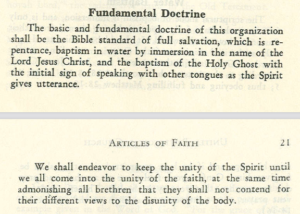
What many current UPCI members do not realize, is that some of the people who came together to form the organization, believed that a person was saved upon repentance, but should go on to be water baptized in the name of Jesus and speak in tongues. Today you would likely not hear such a teaching in a UPCI church. David Bernard, the current General Superintendent, has downplayed the fact that the two groups had differences in beliefs.
This difference is why there is a mention in the fundamental doctrine concerning not contending for one’s individual beliefs. Due to the original wording, two groups were able to agree to come together and not cause division over when a person was considered saved.
Stanley Chambers (the first General Secretary of the United Pentecostal Church, who later became the General Superintendent in 1967), stated in an article published in the Pentecostal Herald (Official UPC Publication), that when the two groups merged to form the UPC, “one of the greatest problems for them to consider was the Fundamental Doctrine.” He shared there was “much discussion” about it.
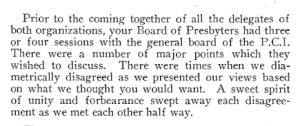
In the October 1945 edition of the Pentecostal Outlook, the official publication of the P.A.J.C., W.T. Witherspoon wrote, “Prior to the coming together of all the delegates of both organizations, your Board of Presbyters had three or four sessions with the general board of the P.C.I. There were a number of major points which they wished to discuss. There were times when we diametrically disagreed as we presented our views based on what we thought you would want. A sweet spirit of unity and forbearance swept away each disagreement as we met each other half way.”
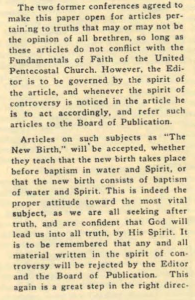
In the very first edition of The Pentecostal Herald after the merger, Oscar Vouga wrote, “The two former conferences agreed to make this paper open for articles pertaining to truths that may or may not be the opinion of all brethren, so long as these articles do not conflict with the Fundamentals of Faith of the United Pentecostal Church. …
“Articles on subjects such as ‘The New Birth,’ will be accepted, whether they teach that the new birth takes place before baptism in water and Spirit, or that the new birth consists of baptism of water and Spirit. This is indeed the most proper attitude toward the most vital subject, as we are all seeking after truth, and are confident that God will lead us into all truth, by His Spirit.”
How things have changed in the United Pentecostal Church since their inception!
In the original form of the fundamental doctrine, when it speaks of water baptism, the words “for the remission of sins” were not added until 1973, almost 30 years after the formation of the organization. Some claimed that the words were left out of the original 1945 statement as “an oversight.”
Others, like W.M. Greer and L.H. Hardwick, stated that those words had been deliberately left out and if they had been included in 1945, there would have been no merger.
When the resolution to add “for the remission of sins” was presented in 1973, Greer agreed to second the motion for acceptance as long as there was no official interpretation of the word ‘for’ in the phrase “for the remission of sins.” The word can be understood to mean “because of” or “in order to obtain.”
In Christianity Without the Cross, on page 338, Thomas Fudge shares that Greer failed to “stand up for the merger agreement” and in doing so, he and others “sacrificed, perhaps unwittingly, the binding principles of the merger itself for the sake of peace, political expediency and their own current welfare. … There can be no gainsaying that Greer acted honorably on behalf of unity, but he committed a serious tactical error which could neither be compensated nor reversed. On 23 October 1973 the PCI theological tradition crossed its Rubicon and W.M. Greer unwittingly led the last charge into doctrinal obscurity. That last flight had profound implications. That action had the resulting effect of eliminating whatever residual moorings the UPC might still have retained soteriologically in mainstream Christianity.”
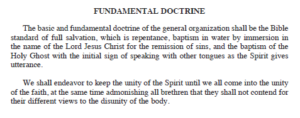
On page 154 of Thomas Fudge’s book, Christianity Without the Cross, he mentions that there was a resolution proposed at one time to remove the word “full” from the term “full salvation” in the fundamental doctrine statement. On page 186 he mentions how there was a submission to the resolution committee to add the words, “and a life of Holiness according to the pattern and example given in the Word of God and described in the Articles of Faith of the UPCI” to the fundamental doctrine as part of the plan of salvation. These resolutions never passed.
To read the entire 1952 UPCI Articles of Faith, go here.
Then & Now: Changes to the United Pentecostal Articles of Faith Part 1: Public School Activities
Then & Now: Changes to the United Pentecostal Articles of Faith Part 2: Holiness
Then & Now: Changes to the United Pentecostal Articles of Faith Part 3: Fundamental Doctrine
Then & Now: Changes to the United Pentecostal Articles of Faith Part 4: Atonement
Then & Now: Changes to the United Pentecostal Articles of Faith Part 5: Conscientious Scruples
********
Shop at our Amazon store! As an Amazon Influencer, this website earns from qualifying purchases.


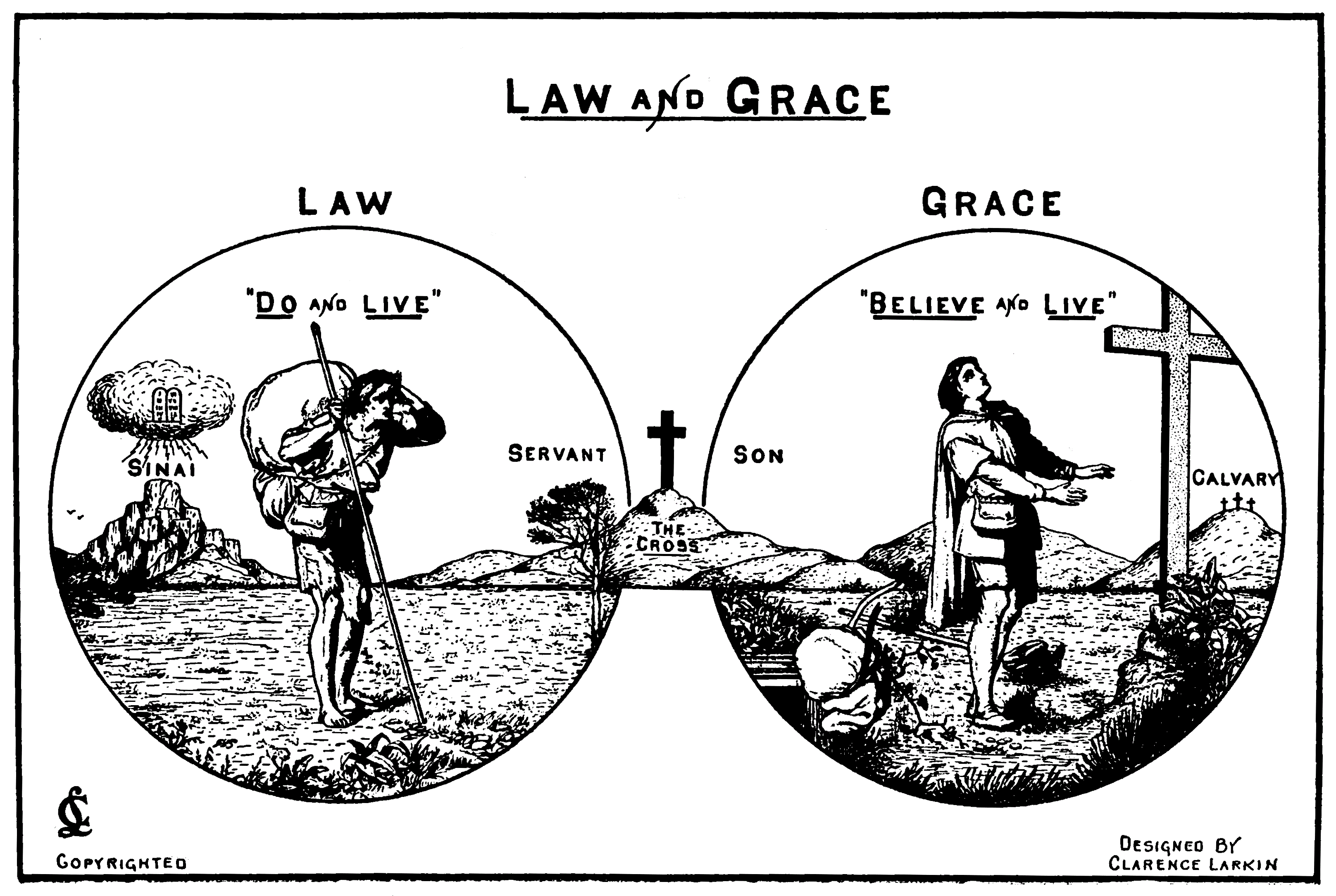

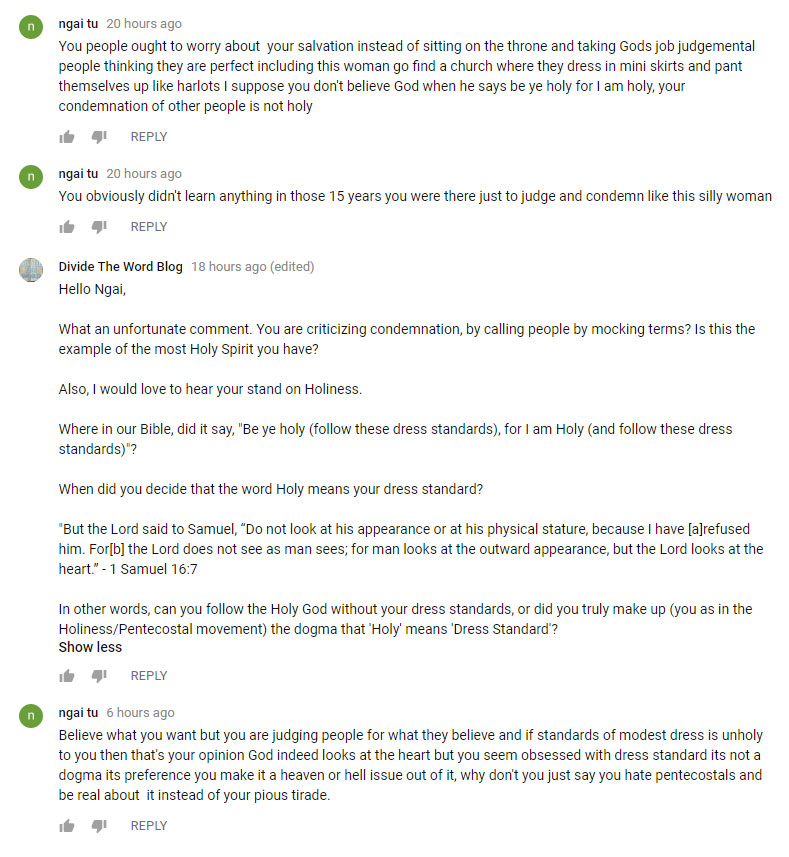
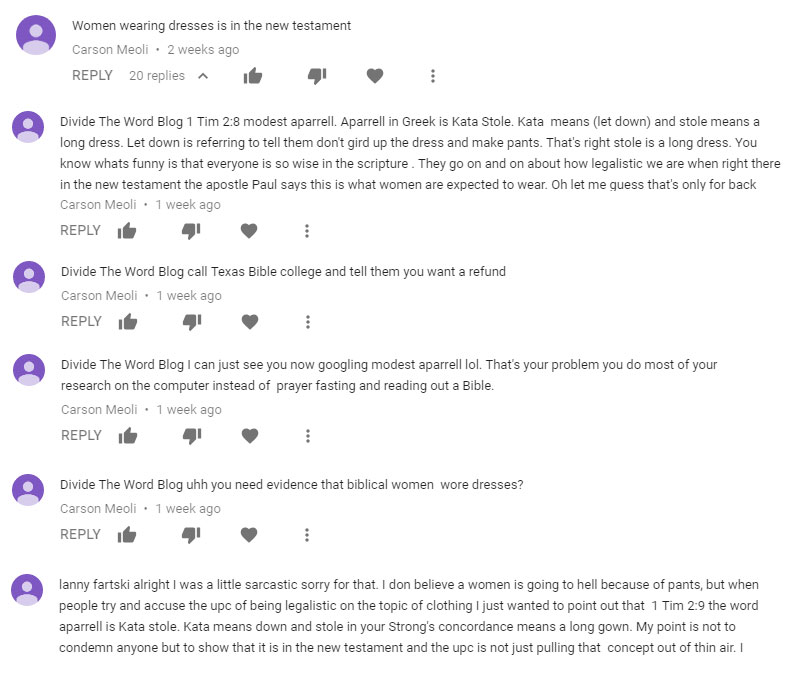


 You see, while we/they can claim that the Standards of the Apostolic Holiness movement are not Laws, they (and I was this way) are being very dishonest. I know people who defend these standards in this fashion who are not intentionally being dishonest, in fact, most aren’t, they are just regurgitating what they are being fed from the pulpit.
You see, while we/they can claim that the Standards of the Apostolic Holiness movement are not Laws, they (and I was this way) are being very dishonest. I know people who defend these standards in this fashion who are not intentionally being dishonest, in fact, most aren’t, they are just regurgitating what they are being fed from the pulpit.
